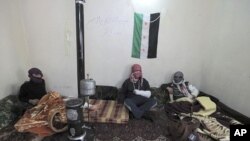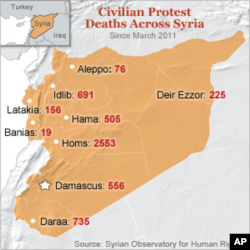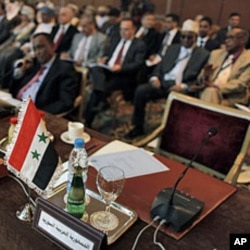Syrian rebel fighters said they have pulled out of the besieged Baba Amr district of Homs after a punishing, month-long military assault by President Bashar al-Assad's security forces.
Calling themselves the Baba Amr Revolutionary Brigades, the rebels said Thursday they are leaving to spare some 4,000 civilians who have insisted on remaining in their homes.
They said the "tactical retreat" reflected "worsening humanitarian conditions, a lack of food, medicine and water, electricity and communication cuts as well as shortages in weapons."
Syrian government forces have moved into neighborhoods and begun a campaign of raids and arrests, according to the Syrian Observatory for Human Rights in London.
Government troops reportedly killed at least 17 people in Baba Amr Thursday.
Rebels call for help
In a statement, the Baba Amr rebels urged the International Red Cross to bring humanitarian supplies into the battered area and warned the government that "any retaliation against civilians would see a severe response" from opposition forces.
Later Thursday, the International Committee of the Red Cross said Syrian authorities have agreed to allow aid groups into Baba Amr on Friday to bring in much-needed assistance, "including food and medical aid, and to carry out evacuation operations."
The Turkey-based commander of the Free Syrian Army, Colonel Riad al-Asaad, said the rebels "have pulled out tactically in order to protect the remaining civilians" in the area, which has seen 27 straight days of heavy bombardment.
An activist in Homs told VOA the retreat did not indicate "surrender," but the fact that opposition forces "ran out of ammunition." He said the resistance would continue in a new form, but did not disclose details.
Syrian government condemned
The United Nations Human Rights Council condemned what it calls "widespread and systematic violations of human rights" by the Syrian government and reiterated the "urgent" need to address the humanitarian situation in the country.
At a session Thursday in Geneva, the council adopted a resolution calling on Assad's government to immediately halt "all human rights violations" and attacks against civilians.
It highlighted the recent deaths of Syrian and foreign journalists, as well as interference in people getting access to medical care.
Russia, China and Cuba voted against the resolution, which was passed by 37 members of the 47-member council. Three member states abstained and four did not vote.
The Russian representative, Vladimir Zheglov, objected to the council action.
“The resolution before us is yet another example of one-sided politicized approaches to the situation in Syria being pushed forward by some countries," Zheglov said.
"The text is not a balanced one," he said. "In a one-sided manner it blames the Syrian government for the violence and does not have any constructive signals that we need to find a political and diplomatic solution to the crisis.”
The Syrian delegation was not in the room when the vote took place.
Opposition forms military council
Syria's main exiled opposition group, the Syrian National Council, announced it has formed a military council to unify armed resistance against President Assad.
Council head Burhan Ghalioun told reporters in Paris the move was coordinated with the Free Syrian Army and would help channel arms from outside countries to rebels on the ground. He did not say who might supply the weapons, but Saudi Arabia, Qatar and Kuwait have all called recently for arming the opposition.
In Cairo, Arab League head Nabil Elaraby said his group is opposed to arming the Syrian opposition but supports the peaceful protest movement. He said Arab states have agreed to a peaceful solution, as set forth in its road map towards achieving the goals of the Syrian people
U.N-Arab League diplomacy
The Arab League and the United Nations have decided to send former U.N. Secretary-General Kofi Annan as a special envoy to Syria to seek a political solution to the worsening conflict.
"I'm going to the region to talk to all concerned," Annan said in New York. "But, let me say one thing: if we are going to succeed, it is extremely important that we all accept that there should be one process of mediation, the one both the U.N. and the Arab League have asked me to lead."
Peter Harling of the International Crisis Group said that the Annan mission appears to be a final effort to reach a negotiated, diplomatic solution before the conflict becomes militarized.
"The nomination or appointment of Kofi Annan creates an opportunity to revive the political track and an eleventh hour opportunity to revive this political track before we move to all-out military confrontation," Harling said.
According to Harling, the Assad government in Syria “feels strong and vindicated” over its military approach to the conflict after getting Russian and Chinese support in the U.N. Security Council, and that it also draws strength from divisions in the Arab world and the international community.
The government, he argued, “believes these divisions will stall any significant threat to itself and that ultimately outside pressure will relent.”
Britain said Thursday it had withdrawn all of its diplomatic personnel from Syria because of security concerns, and the Swiss government said it has temporarily closed its embassy in Damascus "for security reasons." Switzerland had already recalled its ambassador last year.
The U.N. said more than 7,500 people have been killed since the revolt began last March. Syrian officials blame the uprising on foreign-backed armed "terrorists" who, the government says, have killed more than 2,000 security personnel.
Edward Yeranian reported from Cairo and Mark Snowiss from Washington. Lisa Schlein in Geneva and JulieAnn McKellogg in Washington contributed to this report.
| Join the conversation on our social journalism site - Middle East Voices. Follow our Middle East reports on Twitter and discuss them on our Facebook page. |







